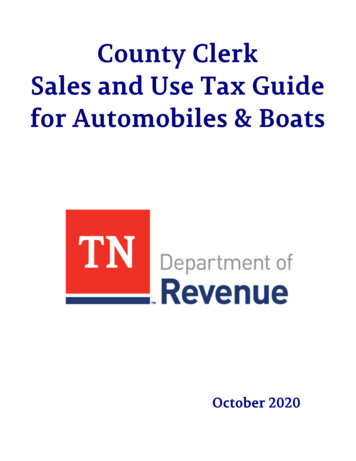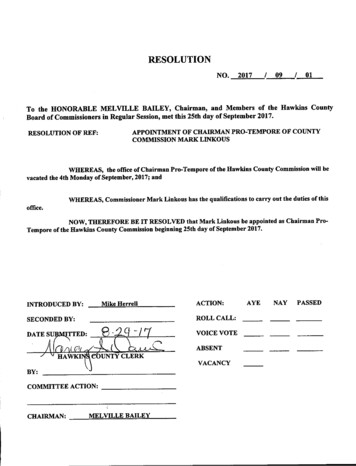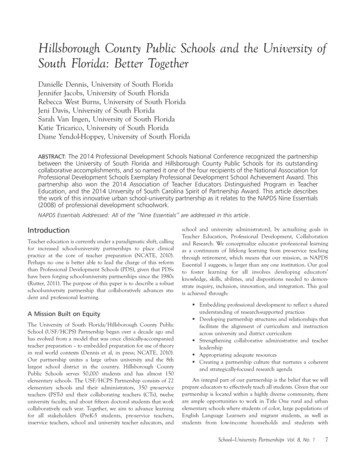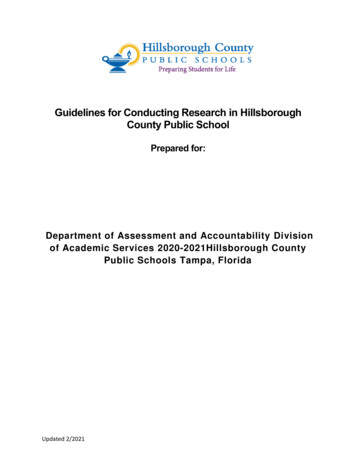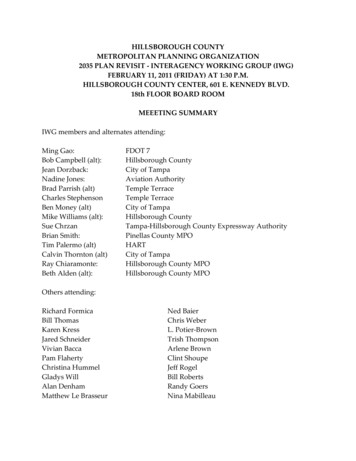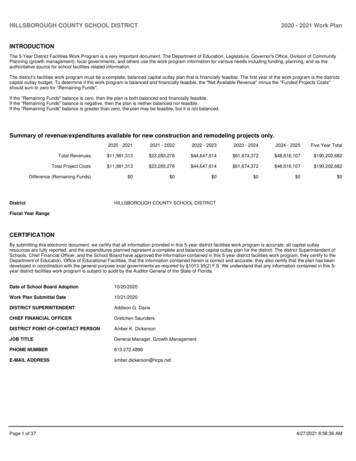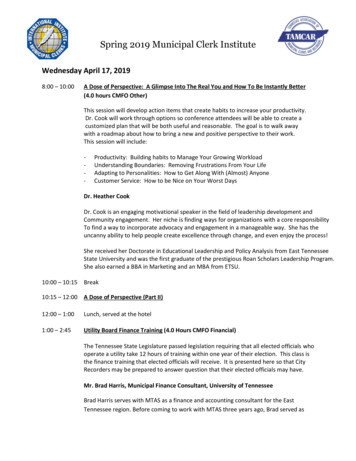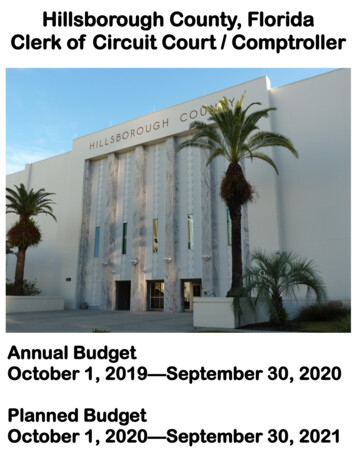
Transcription
Hillsborough County, FloridaClerk of Circuit Court / ComptrollerAnnual BudgetOctober 1, 2019—September 30, 2020Planned BudgetOctober 1, 2020—September 30, 2021
January 27, 2020I am pleased to present the budget for the Hillsborough County Clerk of theCircuit Court/Comptroller for Fiscal Year (FY) 2020.To put this budget in context, it is important to understand the roles andresponsibilities of this Office. The Clerk of the Circuit Court/Comptroller (Clerk)is a ministerial officer whose authority and responsibilities are derived fromboth the Constitution of the State of Florida (State) and statutory provisions.Accordingly, the Clerk only provides services or programs that have beenspecifically assigned by law, order of the Chief Judge, or the Hillsborough CountyBoard of County Commissioners (Board). As such, the Clerk is not able to eliminate a service or activitywithout direction from the Florida Legislature, the Chief Judge, or the Board.As an independently elected official, the Clerk serves as Clerk to the Courts and Comptroller toHillsborough County. The Clerk’s primary responsibilities are outlined in Articles V and VIII of the StateConstitution. These duties are very complex and diverse. These constitutional and statutoryresponsibilities can be grouped into the following major functions: Clerk of the Circuit and County CourtChief Financial Officer including Ex Officio Clerk to the BoardCounty AuditorCounty RecorderSupport ServicesWhile each major function is unique, each function shares a common responsibility for the custodianshipof public records (e.g. court case records, Board records, financial records, and official records).Clerk of the Circuit and County CourtAs Clerk to the Courts, the office is ministerial and includes no judicial authority except that which it mayreceive through constitutional or legislative grant. The Clerk has neither the judicial duty nor the judicialpower to decide the sufficiency of a complaint. The Clerk is required to accept the complaint as tendered,provided it is accompanied by a proper fee. The Clerk must keep all papers, exhibits, evidence, and anyother records of the court pursuant to statutes or rules. These records shall be available to the court andto the public with the exceptions stated in Florida Statute (F.S.) 119. The Clerk must keep a progressdocket, which contains notes of the filing of each pleading, motion, other paper, and any step taken inconnection with each action, appeal, or other proceeding before the court.Page 2 of 156
The Courts function is comprised of several departments, whose primary function is to manage the flowof information through the court system. The receipt, filing, and dissemination of cases to many agenciesand parties to cases, the processing and reporting of case dispositions, and the collection of fines andcourt fees are all handled by Clerk court departments. Additionally, the Clerk provides a wide range ofservices, which include processing traffic citation payments, collecting child support payments andremitting to the State Disbursement Unit for disbursements, and filing domestic violence injunctions. TheClerk is a vital part of the local court system, responsible for coordinating jurors, swearing in courtwitnesses, and recording and protecting evidence during a trial. Most of the monies collected areforwarded to the State to fund many State activities ranging from the State court system to variouseducational programs and trust funds.The Clerk’s budget associated with court-related functions is prepared each fiscal year running fromOctober 1st to September 30th. For the FY 2020 year, the budget is reviewed and approved by the Clerkof Courts Operations Corporation (CCOC). By law, the Board is responsible for funding communicationservices, multi-agency criminal justice information systems, and the construction, lease, maintenance,utilities, and security of facilities for the circuit and county courts, Public Defender, State Attorney, andClerk. In addition, the Board is responsible for funding any local court-related programs.The Court departments docket 8.3 million events a year, file 309,000 new court cases, reopen 67,000cases, receive 1,200 Notices of Appeal and serve 256,000 customers in person. In addition, Jury Servicesissues 89,000 jury summonses.The Tax Deed Department is an integral part of the Clerk’s Court organization. It is responsible foradvertising, notifying, scheduling, and holding auctions of real property that meet the criteria to be soldfor delinquent taxes. Once the property is sold and there are surplus monies after the taxes and afterapplicants have been paid, the Tax Deed Department notifies the property owner(s), lien holder(s), andinterested parties of the surplus funds (overbid) to which they may be entitled. Auctions are held onlineweekly. The Tax Deed Department processes 850 tax certificates a year and conducts 200 property sales.Chief Financial Officer Including Ex Officio Clerk to the BoardThe Clerk is the Chief Financial Officer of Hillsborough County. Although this role primarily covers actingas ex officio Clerk to the Board of County Commissioners, it also includes preparing the entire County’sComprehensive Annual Financial Report, financial reporting to the state of Florida Department of FinancialServices and Auditor General per F.S. 218.32 and 218.39, and coordinating the annual County audit by theCounty’s independent Certified Public Accountants in accordance with F.S. 11.45. As ex officio Clerk tothe Board, the Clerk has the statutory duty to keep the records and minutes of the Board of CountyCommissioners per F.S. 28.12. In this capacity, the Clerk is custodian of the Board seal, which is affixed toany paper or instrument when it is proper and necessary. The Clerk, under Article V of the StateConstitution, functions as county auditor and custodian of all Board funds. Thus, the Clerk has all theduties that comprise the treasury function including: receiving and depositing all funds of the Board perPage 3 of 156
F.S. 136.03, investing excess Board funds per F.S. 28.33, and keeping an accurate and complete set ofbooks per F.S. 136.05.The Clerk possesses significant responsibilities in the area of disbursing Board funds. The Clerk ispersonally responsible for ensuring that every transaction that results in an expenditure of funds is legalin every respect. Where this becomes most important is in the expenditure of funds designated forspecific purposes, such as proceeds from bond issues, grants, and tax revenues for specified programs.These expenditures often involve vague areas that may not be clearly defined by statute or agreement,thus necessitating the pre-audit of all invoices prior to payment and the payment only on warrants/checksdrawn on Board depositories signed by the Chairman of the Board and attested by the Clerk.The roles and responsibilities as ex officio Clerk to the Board are fulfilled by the County Finance, Payroll,BOCC Records, VAB (Value Adjustment Board), Enterprise Solutions and Support, and Board SupportServices Departments.The County Finance Department is responsible for the delivery of most functions associated with theClerk’s responsibilities as ex officio accountant to the Board and custodian of all Board funds. This includesAccounts Payable, Accounts Receivable, Treasury, Investments, Financial Reporting and other accountingfunctions for the Board, as well as other agencies such as the Supervisor of Elections, Hillsborough CountyCity-County Planning Commission, and Environmental Protection Commission. It also includes Countyfunding of the 13th Judicial Circuit Court, State Attorney, and Public Defender. County Finance operatesin a nearly paperless environment through utilization of imaging and workflow software to electronicallymove invoices, receipts, and supporting documents throughout the Clerk and Board offices.The Accounts Payable function is responsible for pre-auditing all payment requests made by vendorsproviding goods and services to these agencies, paying vendor invoices, tracking payments according tothe agency’s contracts, withholding and balancing contract retainage, and reconciling vendor statementsto invoices paid. Invoices are monitored for accuracy and compliance with contracts, Board ordinancesand policies, administrative directives, Florida statutes, and federal law. The Accounts Payable functionalso handles various financial and tax reporting required by federal and State law related tovendor/contractor payments (i.e. Internal Revenue Service 1099 forms).The Clerk’s Office pays vendor invoices via check, automated clearing house (ACH), and wire transfer andencourages vendors to utilize ACH to avoid the issuance of paper checks, reducing the risk of fraud. Tolimit the Clerk’s and Board’s exposure to fraud, the Clerk utilizes the bank’s positive pay program, whereall checks presented for payment at the bank are verified for check number, check date, vendor name,and amount prior to the bank honoring the check.Accounts Payable serves 12 County Agencies and pays approximately 179,000 invoices per year (including37,800 purchasing card transactions) with 99% paid within 10 days of receipt.The Revenue and Treasury function administers banking relationships for the Board and supportedagencies. This function is also responsible for investing and managing the Board’s investment portfolio;Page 4 of 156
auditing, recording and reconciling bank deposits; and managing the distribution of the CommunityInvestment Tax and 9th Cent Fuel Tax to County municipalities.The Revenue and Treasury function manages an approximate 1.9 billion investment portfolio consistingof money market accounts, treasuries, agencies, commercial paper, corporate bonds, and the State’s localgovernment investment pool. This function also manages banking relationships related to the 14 bankaccounts held on behalf of the Board and supported agencies.The General Accounting/Financial Reporting function provides the final check and balance for thefinancial information of the Board and supported agencies. It monitors the budget and financialtransactions for accuracy and proper accounting treatment. In addition, this function records and tracksfixed assets inventory for the Board and all of the Constitutional Offices. Capital assets include assets suchas land, buildings, equipment as well as infrastructure assets such as streets, sidewalks, and bridges.The General Accounting function performs all accounting associated with 172 grants and capital projects.It also monitors budget and debt compliance including reporting any significant changes to the Board’sfinancial ability to meet debt commitments to the Electronic Municipal Market Access (EMMA) portal andprepares the IRS arbitrage rebate calculations.The Financial Reporting function prepares various reports, including those related to bond compliance;federal and state returns; audited financial statements; state financial reports; various interim financialreports; and various State and agency reports. Some of the major reports prepared by this functioninclude: Comprehensive Annual Financial Report (CAFR)Federal and State Single Audit ReportsAnnual Local Government Financial Report to the Florida Chief Financial OfficerAll Inclusive Financial Report to the Florida Auditor GeneralFinancial Summary Report, an easy-to-read financial report for the publicStatement of County-Funded Court-Related FunctionsState of Florida Solid Waste Management Facility LetterPublic Depositor Annual ReportTourist Development Funds Quarterly Financial ReportsState and Local Monthly Revenue ReportsAbandoned Property ReportsSales Tax ReportingIn order to minimize the cost of printing and mailing statements, the County Finance Department utilizeselectronic information sharing whenever possible. Reports (including the Board’s CAFR) are published onthe Clerk’s website at www.hillsclerk.com. The Clerk’s Office has received a Certificate of Achievementfor Excellence in Financial Reporting for 37 consecutive years. This Certificate is presented by theGovernment Finance Association of the United States and Canada to government units and publicemployee retirement systems whose comprehensive annual financial reports achieve the higheststandards in government accounting and financial reporting. The County Finance Department has alsoPage 5 of 156
received the GFOA’s Award for Outstanding Achievement in Popular Annual Financial Reporting for itsseparately issued Financial Summary Report for 16 years. The Financial Summary Report is a simplifiedpopular annual financial report specifically designed for the general public.The Payroll Department handles the wage and salary records for employees of the following entities: Board of County Commissioner/County AdministratorClerk’s OfficeSupervisor of Elections (including poll workers)County-funded portion of the Court AdministrationEnvironmental Protection CommissionCounty AttorneyHillsborough County City-County Planning CommissionVictim’s AssistanceThe Payroll Department also supports payroll-related provisions of three collective bargainingagreements: AFSCME (American Federation of State, County and Municipal Employees)EMPACCT (Emergency Medical Personnel and Critical Care Technicians)IAFF (International Association of Fire Fighters)The Payroll Department is responsible for paying all wages, overseeing voluntary and involuntarydeductions for three individual tax entities (companies), and filing all financial and tax reports required byfederal and State law. Payroll also manages Florida Retirement System reporting and payment of themonthly retirement expenses.The Payroll Department pays approximately 5,900 employees every two weeks, representing over 300million in gross wages. The department issues 153,200 checks or direct deposits per year.The BOCC (Board) Records/VAB (Value Adjustment Board) Department fulfills the requirements for theex officio Clerk to the Board and provides Board meeting minutes in accordance with 28.12 F.S. and thecustodial requirements and preservation of Board records in conjunction with F.S. 119.021. ThisDepartment is also responsible for maintaining a permanent file of all documents presented to the Boardduring its meetings. Documents that are presented to the Board, but not fully executed, are tracked untilcompleted and signed by the Board Chairman. Minutes, with direct links to the audio portion of themeeting, are available online once approved by the Board. All Board documents are imaged and are fullysearchable on the Clerk’s website.The BOCC Records/VAB Department, as ex officio Clerk to the VAB, provides the functions described inF.S. 192, 193, 194, 195, and 196 and Florida Administrative Code 12D-9, 12D-10, and 12D-16. TheDepartment files, tracks, and archives VAB petitions for changes in appraisal value and exemption status.Petitioners can file online or in the Clerk’s VAB office. Petitions are scanned and provided electronicallyto the special magistrates and the Property Appraiser’s Office for the hearing process. The DepartmentPage 6 of 156
schedules and records hearings and resulting decisions, distributes the results of the hearing topetitioners, and manages the VAB revenues and expenditures. The Value Adjustment Board accepts 2,400VAB petitions a year, representing 2,700 parcels. They hold 1,200 hearings.The BOCC Support Services Department provides administrative support to the Board on the second floorof the County Center. Services include receptionist; ordering office supplies; mail distribution;correspondence for the Board Chairman; the coordination of appointments to boards, councils,authorities, and commissions on which individual Commissioners sit or make appointments; managingthe Board’s master calendar; acting as payroll coordinator; coordinating financial disclosure and allactivities surrounding the Board’s Investiture Ceremony and Reception. The BOCC Support ServicesDepartment processes 357 applications for appointments to the 49 boards and councils as terms expireor positions become vacant and distributes 8,600 pieces of mail to the Commissioners.The Clerk’s Accounting Department provides services similar to those of County Finance except, ratherthan providing support to the Board, the Clerk’s Accounting Department supports the office of the Clerkexclusively.Services provided include general accounting; financial statement preparation;disbursements associated with vendor/supplier invoices, court orders, jurors, witnesses, tax deeds, andoverpayment refunds; cash receipts and associated distribution to appropriate State and local agenciesand trust funds; and treasury functions associated with investments, bank reconciliations, and accountingof the court registry.The Clerk’s Accounting Department reconciles 5,200 deposits a year, processes 13,000 vendor invoicesand court orders for payment, and pays 13,600 jurors & witnesses.County AuditorThe County Audit Department serves the citizens and taxpayers of Hillsborough County. The Departmentprovides independent, objective assurance and consulting activities designed to add value and improvethe Clerk’s and Board’s operations. The Department helps these organizations accomplish their objectivesby bringing a systematic, disciplined approach to evaluate and improve the effectiveness of riskmanagement, control, and governance processes under the Clerk and Board. The Department conductsperformance, management, and compliance audits based on a risk assessment and workplan developedprior to the start of each fiscal year. The County Audit work plan is developed based on criteria suggestedin the International Standards for the Professional Practice of Internal Auditing (Red Book Standards), aspublished by the Institute of Internal Auditors. Follow-up audits are performed 6 to 12 months afteroriginal audit reports are issued. The Department’s goal is for management of the audited area toimplement 80% of the audit recommendations prior to the follow-up date.The County Audit Department issues 32 Audit Reports, Management Assistance Letters and InvestigationReports per year.Page 7 of 156
County RecorderThe Recording Department records, indexes, and archives all documents that create the Official Recordsof Hillsborough County. Over 35 million documents have been recorded in the Official Records since 1965,with additional recorded documents extending to 1846. The Recording Department also collects moneyfor documentary stamp taxes, intangible taxes, recording fees and other miscellaneous fees. They record514,000 documents a year.The Clerk acts as an agent for the State for issuing marriage licenses per F.S. 741. As a public service, theDeputy Clerk may also perform marriage ceremonies. The Recording Department issues 10,500 marriagelicenses each year.The U.S. Department of State has authorized the Clerk to accept passport applications. The Clerk's Officecannot issue a U.S. passport. A passport can only be issued by the Department of State through regionalpassport offices. The Clerk's Office is a passport application acceptance facility. The RecordingDepartment processes 7,200 passport applications a year.Support ServicesThe Information Technology Department is responsible for all technology and telecommunicationservices within the Clerk’s Office. The Clerk’s Office processes large amounts of transactions (data andmoney) daily, handling them according to State statutes, local rules, court rules, and policies. As such,technology is at the core of the efficiencies and the productivity gains made by the Clerk’s Office over thelast decade, as well as an integral part of the major technology initiatives currently underway within theorganization. Within the past six years, the Clerk’s Office implemented major systems in the areas ofcourts (Tyler Odyssey), finance and accounting (Oracle ERP in conjunction with the Board and
Hillsborough County, Florida Clerk of Circuit Court / Comptroller . The roles and responsibilities as ex officio Clerk to the Boardare fulfilled by the County Finance, Payroll, BOCC Records, VAB (Value Adjustment Boa


